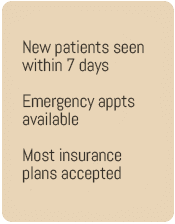Managing Side Effects of Chemo
Chemotherapy is a key treatment option for people with cancer, but the side effects of chemo can be difficult to manage. Understanding these side effects and how to alleviate them can significantly improve the quality of life for patients undergoing cancer treatment. Keep reading to learn options for managing chemotherapy side effects.
What is chemotherapy?
Chemotherapy uses powerful anti-cancer drugs to destroy cancerous cells so they cannot continue to grow and spread in the body. It is a form of treatment that can target cells beyond the original location of the tumor.
Chemotherapy treatment can be used alone or with surgery or radiation therapy. It is usually given after surgery to remove any remaining cancer cells.
The type of treatment is based on the stage of cancer, size of the tumors and type of cancer.
Side effects of chemo
Chemotherapy drugs can also damage healthy cells in the bone marrow, hair follicles, and the mouth and stomach. When the cells are damaged, a patient can experience side effects, including:
Nausea
One of the most common side effects of chemo is nausea and vomiting. To alleviate these symptoms, doctors often prescribe antiemetic medication to ease discomfort.
Patients can also try to eat small meals throughout the day and avoid spicy or greasy foods. Bland foods like crackers, rice and bananas can help with bouts of nausea. Hydration is essential, so keep water and other clear fluids on hand to sip throughout the day.
Fatigue
Patients can become easily fatigued when undergoing chemo because of its toll on the body. Getting plenty of rest and sleep allows the body time to recover and helps increase energy levels for daily activities. Patients should not hesitate to ask family or friends for help with household tasks when feeling tired or sluggish.
Light exercise, such as short walks or stretching, can boost energy levels. Maintaining a good diet can help the body get the nutrients it needs for energy.
Hair loss
Chemotherapy targets rapidly growing and dividing cells, including those found in hair follicles. As a result, it damages the follicles and causes hair loss, which can cause emotional distress. A few ideas for minimizing the stress of hair loss include:
- Wearing a scarf or beanie to protect the scalp and keep the body warm
- Consider alternatives such as wigs or hairpieces
- Join a support group to help with emotional concerns about hair loss
- Remember that hair will grow back once chemo treatment is over
Weakened immune system
The anti-cancer drugs in chemo can lower healthy white blood cells, which makes patients more prone to infections. It is important to practice good hygiene, including washing hands regularly. A mask can protect against germs while in large crowds or small spaces.
Talk to your doctor for information on vaccines, supplements or other treatments to keep the immune system healthy.
Anemia
Drugs in chemotherapy drugs can cause anemia in some patients. Without enough red blood cells, the body cannot carry oxygen throughout the body. Anemia can cause a patient to feel light-headed, short of breath and faint. Patients can have red blood cells tested during chemo if they have symptoms of anemia.
Mouth conditions
Chemotherapy drugs can cause mouth sores and dry mouth. It is important to maintain oral hygiene with regular brushing and flossing. Mild mouthwashes to rinse your mouth can also help.
Drinking water throughout the day can help with dry mouth symptoms. Mouth sensitivity can make spicy or hot foods difficult to eat, so stick with mild flavors and warm or cool foods.
Some patients may develop a sore throat or experience pain with swallowing. Speak with a doctor if these symptoms occur.
Changes in skin
Patients undergoing chemo treatments may notice changes in their skin. One side effect is dryness. The skin may feel rough or become flaky.
Chemotherapy side effects may also include sensitivity to sunlight and increased risk of sunburn. Lotions with SPF can help with dryness and protect the skin from sun exposure.
Some chemo treatments may cause a change in skin pigmentation. The skin may become lighter or darker. Ask your provider about any concerning changes in the skin.
Decreased appetite
Chemotherapy can change a patient’s appetite and food preferences. Loss of appetite can cause weight loss. It is important to continue eating healthy meals to ensure the body gets enough nutrients.
Eat smaller meals throughout the day instead of three large meals. Try flavored waters or other low-sugar beverages to stay hydrated.
Depression
Dealing with the side effects of chemotherapy can take an emotional toll on patients. Mental health is just as important as physical health when facing a cancer diagnosis and treatment plan.
Many patients benefit from joining support groups or counseling sessions to share experiences with others going through similar journeys.
Understanding how to manage stress levels can help cancer patients better cope with the physical and mental changes they are experiencing.
For cancer patients undergoing chemotherapy, it is important to manage the side effects of chemo throughout the treatment. By receiving the necessary support and care, patients can concentrate on their health and recovery process.
Chemotherapy specialists in Raleigh and Durham
At Personalized Hematology-Oncology, our cancer care team specializes in treating all types of cancer with a comprehensive approach. Our top priority is to provide compassionate care and customized treatment plans for each patient. To learn more about our unique practice, please call our office to schedule an appointment.
The American Cancer Society offers programs to support patients during and after cancer treatment. Find support in your area.





